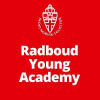© Pint of Science, 2026. All rights reserved.
Waarom is de ene persoon met erfelijke slechthorendheid al jong slechthorend en anderen pas als ze veel ouder zijn?
Janine Reurink
(Wetenschappelijk onderzoeker bij de afdelingen KNO en Genetica van het Radboudumc)
Het DNA van ieder persoon is uniek. Maar wanneer maken verschillen in ons DNA ons wie wij zijn? En wanneer zijn deze verschillen betrokken bij ziekte? Mijn onderzoek gaat over kleine veranderingen in je DNA die in gezonde mensen geen enkel effect hebben. In mensen met erfelijke slechthorendheid kunnen deze veranderingen mogelijk verschil maken tussen al jong doof zijn of pas veel later. Ik probeer je mee te nemen in onze zoektocht door het DNA.
Waarom schrijven mensen verhalen over diplomaten?
Frederik Van Dam
(Assistant Professor of European Literature at Radboud University)
In crafting stories that revolve around international conflicts, writers often accord an important role to the figure of the ambassador, from Rosencrantz and Guildenstern in Shakespeare’s Hamlet to Kate Wyler in the recent Netflix series The Diplomat. In this short talk, I want to have a closer look at research into this tradition of writing. How have writers incorporated the figure of the diplomat in their fictions? How does the representation of diplomacy relate to changing views on the function of diplomacy? What may a cultural perspective on diplomacy reveal that remains under the radar in the approaches of, for instance, legal studies or conflict studies? Although the current conflicts in Ukraine and Gaza make this topic a timely concern, I will focus on the period in between the two World Wars, when writers such as Marcel Proust developed what the contemporary critic Albert Thibaudet calls le style de la valise, a “universal language of sleeper cars and cinema, auxiliary to the universal language of music, a cosmopolitan literature of trips, capital cities, beings that join in solidarity with the diplomatic vocation.” The emergence of style of writing in the first half of the twentieth century, I will argue, must be understood in response to the concomitant emergence of ‘geopolitics’ as a prism for foreign policy. By investigating this ‘diplomatic’ use of literature, I hope to trace a new way in which the field of cultural studies may contribute to ongoing research into ‘globalized fear’.
Wanneer kunnen we ziekteverspreiding door muggen nou echt gaan stoppen?
Milou Stevens
(PhD candidate at RadboudUMC)
In mijn onderzoek duik ik in de wereld van het dodelijkste dier: de mug! Ik ontcijfer de geheimen van muggenimmuniteit en energiehuishouding om te begrijpen waarom muggen zulke goede ziekteoverbrengers zijn zonder zelf ziek te worden. Het ontrafelen van deze geheimen is cruciaal om de verspreiding van vele ziekten te voorkomen!
Waar was ik ook alweer? De wetenschap van dwalende gedachten
Myrthe Faber
(Assistant Professor in Cognitive Science & Artificial Intelligence at Tilburg University)
Je kent het wel: je bent iets aan het lezen, maar terwijl je ogen nog bewegen heb je geen idee wat je net gelezen hebt omdat je aan andere dingen denkt. Waar komen deze gedachten vandaan? En is dit verschijnsel vooral lastig, of het is misschien ook nuttig? Dr. Myrthe Faber laat zien dat onze willekeurige gedachten misschien wel niet zo willekeurig zijn als je denkt.
Map data © OpenStreetMap contributors.

